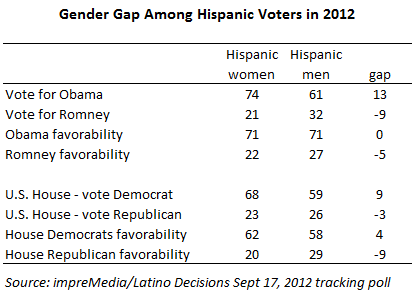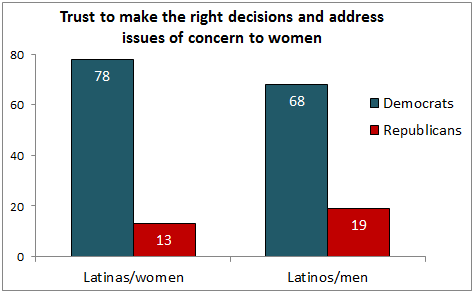With seven weeks until the election Republican candidate Mitt Romney’s potential gender gap with women faces a new hurdle in the Latino community, as reported today by Pilar Marrero. According to the fourth week of the impreMedia/Latino Decisions tracking poll Latina voters plan to vote for President Obama by a margin of 74% to 21% for Romney – a 53 point gap. Among Latino men, 61% plan to vote for Obama and 32% for Romney. The September 17 polling data suggest the President continues to solidify his lead among Latinos, and there are no signs of cracks in the Obama coalition among Latino voters. Overall Obama holds 68% of the Latino vote to 26% for Romney, erasing the small bump Romney received in the September 3 (week 2) poll release following the RNC convention. [Full Week 4 results by gender here]
But it is among Latina voters that Romney and the Republican party fare the worst. The impreMedia/Latino Decisions tracking poll data show very clearly that Hispanic women are very opposed to Mitt Romney and the Republican party image right now. Romney’s favorability is 27% among Latino men and just 22% among Latinas, while Republicans in Congress are seen favorably by 29% of men, but just 20% of women in the Latino community. Looking towards the vote in the U.S. House, 68% of Latinas say they will vote Democrat compared to 59% of Latino men.

Given the focus of female voters and issues in the 2012 election the impreMedia/Latino Decisions tracking poll included a new question asking Hispanic respondents which party was better equipped to address issues important to women. When it comes to handling issues of concern to women, Latino voters – both men and women say that the Democratic Party is more trusted to handle women’s issues. However, among Latinas, we find a 65 point advantage for the Democrats on women’s issues, perhaps the largest gap on any policy issue our polling data has ever revealed – this is very bad news for the Republican Party. What’s more, our data indicate that Latinas are more motivated to vote in 2012 than are Latino men. Among Latinas, 59% say they are very enthusiastic about voting this year (51% for men) and 88% say they are certain to vote (84% of men).

Explaining the gender gap among Latinos
While much has been written about the gender gap in presidential election this year, little has been said about Hispanic women. Earlier this year, Victoria DeFrancesco Soto was one of the first to point out that Susana Martinez alone would not solve the Latina gender gap for Republicans, and that much deeper policy issues were at stake. Last week, Rob Preuhs pointed out that a June Latino Decisions poll in Colorado found a sizable gender gap emerging there as well. Given the historic and current state of party platforms and policy issues, we identify five reasons why Hispanic women are less inclined to support the Republican party.
1. The hostile rhetoric about immigrants has been gendered – “anchor babies” is a slur directed at Hispanic mothers – and it is no surprise Latinas think Democrats are better than Republicans at women’s issues. Ugly framing about Latina fertility and their children in context of immigration position-taking probably led many Latinas to think Republicans were not in their corner well before they started parsing words defining rape, adopted a platform position to ban all abortions, and waged a fight against covering birth control. It would be entirely shocking if Hispanic women suddenly became the champions of the party and candidates that put that phrase into the national lexicon.
2. When 78% of Latinas, and 68% of Latinos say that Democrats are better at women’s issues relative to the GOP, it is likely a reference to a whole host of issues that matter for Hispanic women, not merely a reference to abortion politics. Abortion and contraception consistently rank last among the most important issues to Latina and Latino voters. It almost does not matter how we conceive of “women’s issues”, Democrats have taken positions much more favorable to Hispanic women – affordable health care, DREAM Act support, Sotomayor’s nomination to the Supreme Court – compared to Republicans.
3. The idea that the economy, jobs, immigration, and health care are singular issues may not be so useful when we think about the perspective and experience Latinas (and Latinos for that matter) bring to these topics. It may not be useful to think about “the most important issue”, or “women’s issues” because things like jobs, economic concerns and heath care are inextricably connected for this community. For example, Latina voters are likely to have more care-giving responsibilities than other voters, and less income. We know that Latinos lack health care at higher rates, have more children than non-Latino whites, and have more multi-generational households (e.g. older family members live in the same home). All of these factors make “health care” more pressing for Latina voters who are concerned with their family’s actual health, as well as the impact it can have on the household’s economic stability.
4. Latina voters are more likely to say that the DREAM act is a priority issue, many Latinas – whether they are parents or not – think of the DREAM act as a long-term solution that provides economic and employment opportunities for their friends, children and larger community. So again, the economy and immigration policy are not two different things.
5. While there are differences between Hispanic men and women, it is important to notice that they are on the same side — well over half of Latinos and Latinas prefer Obama over Romney, are certain they will vote, and think Democratic outreach is much better than Republican outreach. This is not the same phenomenon as the white voter gender gap, that usually refers to men and women taking opposite positions on issues or candidates. The “Latino Gender Gap” is nothing like the white voter gender gap. Since Latinos and Latinas are similarly situated in terms of the social and economic status, their political preferences and behavior is pretty much alike. Hispanic men don’t like their kids being called “anchor babies”, or having their mothers insulted either.

